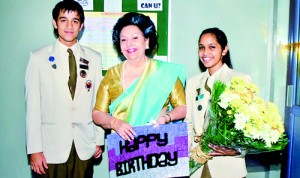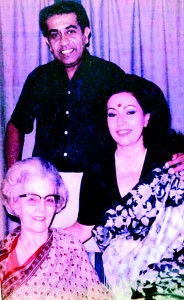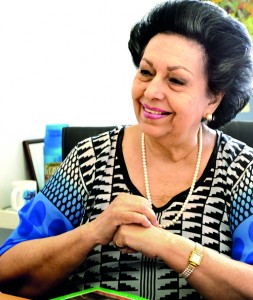A visionary educationist returns
Goolbai Gunasekara remembers the times when her mother would come in to her class at Buddhist Ladies College and sit in, a “very annoying habit” she was heartily tired of. “She would do this to all of us at school,” grins the educationist. “She’d walk in and say, ‘I’d love to learn something today’ and then scare us witless by sitting through a lesson.” So one day, when Clara Motwani seated herself in the back of the class once again, Goolbai decided that enough was enough. She taught her girls a scandalous lesson in feudal matrimonial practices-her mother later commended her on a lesson well planned, but would never come in for her classes again!

To GG with love: A birthday celebration at school
Today, 50 years after Goolbai first embarked on a teaching career that has been as fulfilling as it was illustrious, it is she who finds herself slipping effortlessly into a role her mother set the precedent for. As the Founder Principal of the Asian International School (AIS), she has just returned to her role after a brief retirement and says “there’s nothing I enjoy more.” Just as Visakha Vidyalaya was for her mother, AIS is Goolbai’s stamping ground; she helped W.P. Perera establish the school in 1989 and has seen it through a great many ups, downs and the occasional hiccup. Her grandchildren schooled here and her album is full of photos of students both former and present. They call her ‘GG’, we’re told.
Many will already have heard the story of her parents, renowned educationists Dr. Kewal and Mrs. Clara Motwani who met in the US- Clara, an American who was studying language and music at the University of Iowa and Dr. Motwani, an eminent Theosophist and scholar who was studying in Yale at the time. Dr. Motwani-in a forward thinking gesture far more brilliant that many of his modern successors-insisted that his wife get an MA in Education for he was sure it would come in useful in Asia. When the duo stopped over in Colombo on their way to India he was proved right-Clara was almost immediately snapped up by Sir Baron Jayatilleke, who was on the lookout for a Principal for Visakha Vidyalaya.

Family portrait: With husband Bunchy and mother Clara Motwani
And so Goolbai grew up in Visakha’s embrace; her father was constantly travelling, so she “rarely saw him when I was young”. Over primary and secondary school, she attended eight schools in Sri Lanka, India and the US. Most would be horrified, perhaps, but for the young Goolbai it was an eye opener and some of the best years of her life. In the States she attended a school that followed the Dalton Plan- a system her mother introduced with great success to the local curriculum- and says that the idea of students having a say in how their studies were carried out had great effect on her perspective of education. It was an intensely varied, diverse experience that Goolbai loved. “It didn’t harm me at all,” she muses. “Except in Mathematics maybe-somehow I never did catch up!”
Her time in India, boarded at the Ooty Convent and at the Grammar School in Karachi (Benazir Bhutto attended rival Convent of Jesus and Mary) is also fondly remembered. The Motwanis never really ended up moving to India, for during the partition Dr. Motwani lost most of his family to the riots. “My father saw to it that we saw every corner of India,” she remembers. “And you know India was not dotted with five star hotels. It was all quite basic, but he insisted and as a result I saw everything!’

A role she greatly enjoys: In her office at AIS. Pic by Susantha Liyanawatte
Although Goolbai considers herself a student of Bishops College-where she spent the majority of her schooling years-her two years schooling in Jaffna, at Hindu Ladies College is still fresh in her mind. “I had a great time,” she remembers. “And everyone worked so hard, so for the first time in my life I worked very hard!” Having left school, Goolbai studied for a degree in History, a subject she adores to this day. We ask if teaching was her end goal and she shrugs delicately. “In those days there weren’t too many options for us like there are for girls nowadays. Teaching was a good profession.” She tells us that she really wouldn’t have it any other way, for teaching is her greatest passion. The young Goolbai trained under Mrs. Motwani, learning many a useful thing about the profession and her mother. She was never given free rein to do as she pleased-“in fact, she was even tougher on me,” she rolls her eyes. Goolbai remembers well not being allowed to take sick leave-“she’d say ‘just take a tablet and come to school”-and adds that her mother even ensured she got married during the school holidays. “Just so I didn’t honeymoon on the school’s time!”
Mrs. Motwani was a stickler for order, she remembers. “She was very conscious of how important it was for a principal to supervise every single aspect of a school.” If something had potential to go wrong it most certainly would, was Clara Motwani’s belief. Goolbai follows the same policy.
It was in sharing these views that she found some of her greatest allies; “Ralph Alles and I were always in agreement that a principal’s job was 60% supervision,” she says- “although perhaps he was a touch nicer in his supervision than I am.”
It was with AIS that she found her place in the world. The offer followed her work with Buddhist Ladies College as Vice Principal (after her mother’s departure). “I remember ringing Elizabeth Moir and her husband and asking them for advice,” she says. “They were extremely supportive and helpful. I’ll never forget that debt of gratitude I owe both of them.” The educationist speaks with great respect and affection of the late W.P. Perera, the AIS founder she likes to describe as a “very visionary, incredibly understanding and cooperative gentleman.” The school had 16 students at the very beginning and within a year had notched up 300 youngsters on its enrolment register. Today this number exceeds a thousand, and none could be prouder than Goolbai of how far they’ve come.
Goolbai had to battle with the authorities to get AIS on the map. At the time of establishment international schools were not the most popular of institutions. “The government kept us out of sports,” she remembers. “So we had to start our own sports, and compete amongst ourselves.” Now, she’s just happy that the rules have been relaxed and her students can compete with a larger crowd.
Whilst complimentary of the education offered in national schools, Goolbai strongly believes that free university education was a major mistake made by the post-independence government. “No country in the world provides free education,” she notes wryly. “Not even the US, and they’re so rich.” Aid can be given to the financially disadvantaged, she points out, but it must be paid back. She remembers her parents giving evidence against the motion at the time it was introduced, saying it would lead to unnecessary complications. “And look at the trouble at universities today-they were completely right!”
She’s also refreshingly honest about dealing with the young people she so regularly encounters. “Now I think it’s ridiculous when people say ‘oh, I love children’ because how on earth can you love everyone? But I do try and treat every child the same. A sense of justice is incredibly important for any teacher, I think.” She remembers her mother doling out a suspension to a powerful friend’s daughter- “she didn’t even think she’d done anything to offend her friend until she realised all contact had been severed!”
This same sense of what is right is what defines Goolbai Gunasekara’s massively successful career as a visionary educationist, but perhaps more importantly-a beloved teacher and principal. After all, “there’s nothing like being brought up by a principal to know what to do!”


